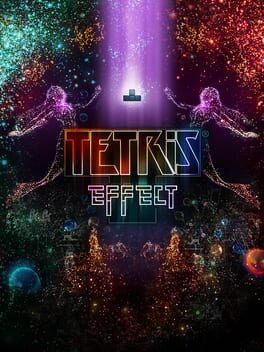You make all these small choices, and the consequences stack up. Each is contingent on what came before. Each carries that contingency forward to the next piece. There on screen you see a well of contingency, the past made visible. The pleasure of wiping it away, line by line, is the pleasure of wiping away your past, the perfect setups and the little mistakes both. This is perhaps the ultimate fantasy of Tetris: that you can wipe away the contingency of the past, deepen your well, give yourself more time.
Tetris itself isn’t timeless. It won’t be played forever. It’s not the perfect game. What a boring idea about videogames, and art. Tetris Effect’s actual achievement is its felt relevance in 2018. That it met our grim current context with old school optimism and a hard puzzle heart. Warmth and pressure. What we need and what we know. Would it have resonated like this five years ago? Will it still five years from now?
Which is not to say Tetris Effect doesn’t stumble in the present. It’s a little too neat. It could have been weirder, wilder, cheesier. Placing Native American riders and Balinese rituals alongside dolphins, hot air balloons, and crystalline pop epiphanies, as if everything can be equally thematized, is a real mistake. And the VR mode throws off the balance of concentration and sensory overload necessary for long plunges into the effect.
It’s in fact the effect of its title that excites me most going forward. More subject, less object. Or at least a more openly subjectified object. I want to see more effects explored, not just the ecstatic and hypnotic and sublime. I want even more unexpected effect modes that don’t add ‘value’ but play out variations on a theme. Videogames as musical fugues that induce psychological fugue states. I’m not talking reskins or remakes or reboots but delirious remixes and deliberate transformations. Not for all time, but for now. Right here. This moment.
Tetris itself isn’t timeless. It won’t be played forever. It’s not the perfect game. What a boring idea about videogames, and art. Tetris Effect’s actual achievement is its felt relevance in 2018. That it met our grim current context with old school optimism and a hard puzzle heart. Warmth and pressure. What we need and what we know. Would it have resonated like this five years ago? Will it still five years from now?
Which is not to say Tetris Effect doesn’t stumble in the present. It’s a little too neat. It could have been weirder, wilder, cheesier. Placing Native American riders and Balinese rituals alongside dolphins, hot air balloons, and crystalline pop epiphanies, as if everything can be equally thematized, is a real mistake. And the VR mode throws off the balance of concentration and sensory overload necessary for long plunges into the effect.
It’s in fact the effect of its title that excites me most going forward. More subject, less object. Or at least a more openly subjectified object. I want to see more effects explored, not just the ecstatic and hypnotic and sublime. I want even more unexpected effect modes that don’t add ‘value’ but play out variations on a theme. Videogames as musical fugues that induce psychological fugue states. I’m not talking reskins or remakes or reboots but delirious remixes and deliberate transformations. Not for all time, but for now. Right here. This moment.
